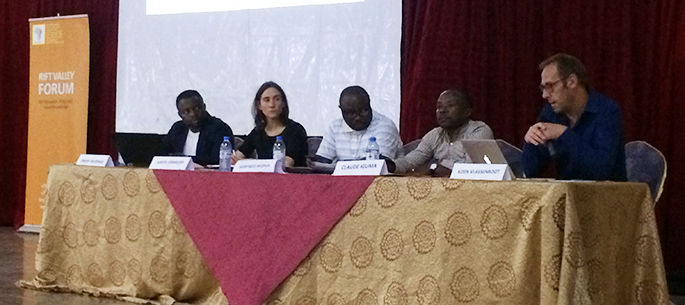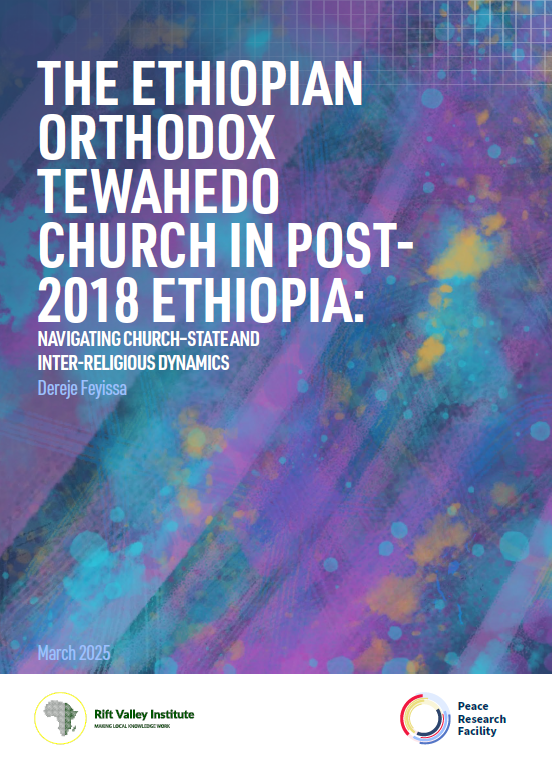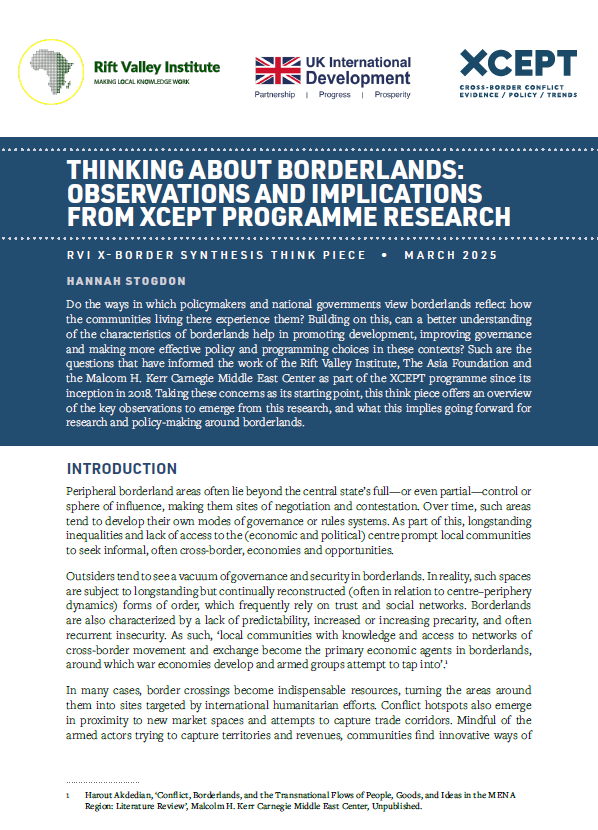How can the recent fragmentation of the armed group landscape in the eastern Democratic Republic of the Congo be explained? What are the effects of armed group presence on local governance? And how do local authorities and local conflicts influence armed mobilization?
These questions provided the backdrop to a panel discussion organized by the Rift Valley Forum and the Political Settlements Research Programme (PSRP) in Goma on 20 September 2016. The panel provided an opportunity to present the research conclusions of the second phase of the RVI Usalama Project launched in 2015. Entitled ‘Governance in Conflict’, this phase examined the relationship between armed groups and local governance in the eastern Congo.
‘…today’s protectors often turn into tomorrow’s predators’
Judith Verweijen, the project’s Lead Researcher, described how military operations by the Congolese army are key in explaining the fragmentation of armed groups, which have dislodged the larger politico-military movements from their strongholds. This in turn, she continued, unleashed a competition for power in those areas, and, due to the ineffectiveness of the army in protecting civilians, created a climate in which smaller ‘armed groups emerged as supposed self-defence movements’. Yet, she concluded, ‘today’s protectors often turn into tomorrow’s predators’, and many of the newly formed groups develop abusive tendencies.

Another factor that explains the proliferation of smaller armed groups, as highlighted by Claude Iguma, is the growing number of local political actors involved in armed mobilization for their own interests. These encompass local authorities—including customary chiefs—but also businesspeople who may draw upon armed groups to ensure access to mineral and land resources. Emery Mudinga further elaborated on the local instrumentalization of armed groups, stating that they ‘can be a tool to access customary or political power’. As he explained, ‘electoral cycles aggravate this trend’, as evidenced by the events in 2011. Furthermore, as armed groups often have a certain legitimacy amongst the communities they are embedded in, ‘customary chiefs may benefit from supporting armed groups to increase their own legitimacy’. And vice versa, ‘armed groups do not only represent their own interests, but also those of others including political actors’.
Koen Vlassenroot, in turn, explained that in certain areas, armed groups have transformed into local authorities themselves, involved in providing justice and protection, and resolving disputes. In some cases, they act as ‘community armies’ and provide these services in collaboration with customary chiefs, who can have a measure of influence on armed groups’ practices. In most cases, however, they act in competition with state and customary authorities. While the provision of services may give these groups some form of legitimacy, their presence nevertheless remains oppressive. They often impose their own interests in disputes and generally continue to appropriate resources from civilians, often in the form of taxation. Reiterating Judith Verweijen’s comment, Koen Vlassenroot therefore labeled armed groups ‘protectors and predators at the same time’.
The ‘interference of armed groups into existing conflicts only exacerbates the cycle of violence’
Another factor identified as contributing to the birth of smaller armed groups is the volatility of local conflict dynamics. It is not excluded that ‘citizens call on armed groups for support in their own—often private—conflicts’ around land or resources. Instead of resolving conflicts, however, the ‘interference of armed groups into existing conflicts only exacerbates the cycle of violence’ and leads to vicious security dilemmas. If one community calls on an armed group to support its case against another, the latter is bound to do the same to protect itself. A similar situation may also emerge when communities distrust the state security services, believing they are biased towards their opponents. The following discussions with the audience underlined the problem of private grudges and score settling, which account for a substantial share of the violence.
What can be done to put an end to armed group proliferation? The panel acknowledged that no easy solutions to this question can be found. Many approaches such as DDR, army integration and negotiations have been tried, but with limited success. The panelists insisted that it remains crucial to reinforce the state’s security forces—securing the population will undermine the popular attraction of armed groups. However, military operations cannot be a stand-alone solution. It is as important to weaken the political networks in which armed groups are embedded and to reduce the intensity of local conflict dynamics. Military, political and social responses to armed groups need to go hand in hand.
‘With a Kalashnikov in my house, I cannot die of hunger’
This multi-faceted approach was confirmed during the open debate. One participant insisted that those political actors who are well known for backing armed groups should be brought to justice, pointing to the widespread problem of impunity in the Congo. Another suggested that the Congolese government ‘does not sufficiently play its role as mediator in customary power struggles’. A final point in this context was the pervasiveness of small arms and the ways in which this militarizes income generation in a context of general poverty. An audience member summarized this logic as follows: ‘With a Kalashnikov in my house, I cannot die of hunger’.
After the discussion Radio Okapi conducted interviews with two of the Usalama researchers and a participant, which is available below.
Moderator
Godefroid Muzalia, Professeur à l’Institut Supérieur Pédagogique / Bukavu
Panelists
Claude Iguma, Usalama Project researcher / University of Wageningen
Emery Mudinga, Usalama Project researcher / University of Louvain-la-Neuve
Judith Verweijen, Usalama Project researcher / Ghent University
Koen Vlassenroot, Usalama Project researcher / Ghent University


